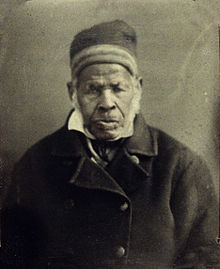Omar ibn Said
This article may be unbalanced toward certain viewpoints. (December 2010) |
Omar Ibn Said | |
|---|---|
 | |
| Born | 1770 |
| Died | 1864 |
| Other names | Uncle Moreau, Prince Omeroh |
| Education | Formal Islamic education in Senegal |
| Occupation(s) | Scholar, Slave |
| Known for | Islamic Scholar, author of Slave narratives |
Omar ibn Said (1770–1864) was born in present-day Senegal in Futa Tooro,[1] a region between the Senegal River and Gambia River in West Africa, to a wealthy family.[2] He was an Islamic scholar and a Fula who spent 25 years of his life studying with prominent Muslim scholars in Africa. In 1807, he was captured during a military conflict, enslaved and taken across the Atlantic Ocean to the United States. He escaped from a cruel master in Charleston, South Carolina, and journeyed to Fayetteville, North Carolina. There he was recaptured and later sold to James Owen. Said lived into his mid-nineties and was still a slave at the time of his death in 1864. He was buried in Bladen County, North Carolina. Omar ibn Said was also known as Uncle Moreau and Prince Omeroh.[1]
Although Omar converted to Christianity on December 3, 1820, [citation needed]. In 1991, a masjid in Fayetteville, North Carolina renamed itself Masjid Omar Ibn Said in his honor.[3]
Manuscripts
Omar ibn Said is widely known for fourteen manuscripts that he wrote in Arabic. Out of all of his Arabic manuscripts, he is best known for his autobiographical essay written in 1831.[4] It describes some of the events of his life and includes reflections on his steadfast adherence to Islam and his openness towards other 'God fearing' people. On the surface the document may appear to be tolerant towards slavery, however Said begins it with Surat Al-Mulk, a chapter from the Qur'an, which states that only God has sovereignty over human beings.
Most of Said's other work consisted of Islamic manuscripts in Arabic, including a handwritten copy of some short chapters (surat) from the Qur'an that are now part of the North Carolina Collection in the Wilson Library at University of North Carolina at Chapel Hill. Transcribing from memory, ibn Said made some mistakes in his work, notably at the start of Surat An-Nasr.
Further coverage of Omar's writings within the context of Slave Narratives and Muslim Slave Narratives can be found in Five Classic Muslim Slave Narratives by Muhammed Al-Ahari. The presentation of Africa, Islam and slavery in the American slave Narratives of Muslim slaves in the Americas is a topic that is often overlooked in discussing the genre of slave narratives and the birth of African American Literature. In fact the first biography was that of a former Maryland slave, Job Ben Solomon, published in 1730 in Britain. By reexamining these often overlooked narratives we can get insight into African Islam, the turmoil of integration into a foreign culture, life in Africa, and life as a slave in the Americas. The primary sources include: the narrative of Job ben Solomon, the two autobiographical pieces of Muhammad Said of Bornu, the Arabic autobiography of 'Umar ibn Said, the Jamaican narrative of Abu Bakr Said, a discussion of coverage on Bilali Muhammad's excerpts from the Risalah of Abi Zaid, Theodore Dwight's articles on the teaching methods of the Serachule teacher slave Lamen Kebe, and a letter describing Salih Bilali.
Further reading
- Thomas C. Parramore, "Muslim Slave Aristocrats in North Carolina," North Carolina Historical Review, April 2000, Vol. 77 Issue 2, pp 127–150
References
- ^ a b Omar ibn Said (1831). "Autobiography of Omar ibn Said, Slave in North Carolina, 1831". University of North Carolina at Chapel Hill.
- ^ Powell, William S. (1979). "Omar ibn Said, b. 1770?". Dictionary of North Carolina Biography. University of North Carolina Press.
- ^ Omar ibn Said Davidson Encyclopedia Tammy Ivins, June 2007
- ^ Jonathan Curiel. Al'America. pp.30-32.
